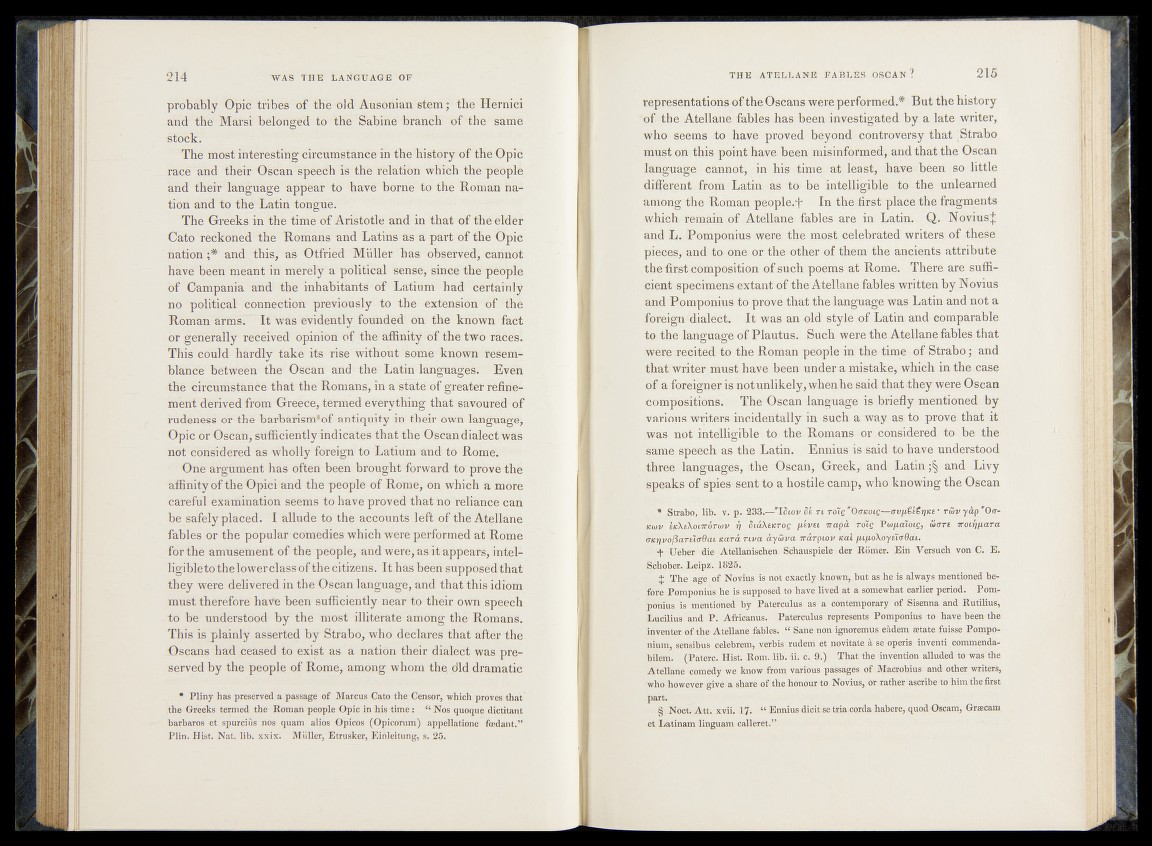
probably Opic tribes of the öld Ausonian stem; the Hernici
and the Marsi belonged to the Sabine branch of the same
stock.
The most interesting circumstance in the history of the Opic
race " and their Oscan'speech is the relation which the people
and their language appear to have borne to the Roman nation
and to the Latin tongue.
The Greeks in the time of Aristotle and in that of th<§l#l#iëf
Cato reckoned the Romans and Latins as a part of the Opic
nation ;* and this, as Otfried Muller has observed, cannot
have been meant in merely a political sense, since the peopll
of Campania and the inhabitants of Latiutn had certainly
no political connection previously to the extension of 5thè
Roman arms. It was evidently founded on the known fact
or generally received opinion of the Affinity of the two racesl
This could hardly take its rise without Some known résém'7
blance between the Oscan and the Latin languages.' Even
thé circumstance that thé Romans, in a statd of greater refinement
derived from Greece, termed everything that savoüred-óf
rudeness or the barbarism'of antiquity in their own language,
Opic or Oscan, sufficiently indicates that the Oscan dialect was
not considered as wholly foreign to Latium and to Rome.
* One argument has often been brought forward'tb* prove the
affinity of the Opici and the people of Rome, on which a moré
careful examination seems to havé proved that hW reliance can
be safely placed. I'.allude to the accounts left of the Ateltófie
fables or the popular comedies which were performed at Rome
for the amusement of the people, and were, as it appears, hrtel-
ligibleto the lower class of thé citizens. It has been suppösédthat
they were delivered in the Oscan language, and that this idiom
must therefore have been sufficiently near to their own speech
to be understood by the most illiterate among the Romans.
This is plainly asserted by Strabo, who declares that after the
Oscans had ceased to exist as a nation their dialect was preserved
by the people of Rome, among whom the, did dramatic
* Pliny has preserved a passage of .Marcus Cato the Censor, which proves that
the Greeks termed the Roman people Opic in his time: “ Nos quoqup dictitant
barbaros et spurcius nos quam alios Opicos (Opicorum) appellatione foedant.”
Plin. Hist. Nat. lib. xxix. Muller, Etrusker, Einleitung, s. 25. .
representations of the Oscans were performed.* But the history
p f the. Atellane fables has been investigated by a late writer,
who seems to have proved beyond controversy th a t ; Strabo
must on this point/have been misinformed, and that the Oscan
language*1 cannot, fifjfehi^krm at least,, have been so little
different frorü 'Latin es to* ,b'e intelligible to the unlearned
among'the Roman people.^ In thedirst place th e fragments
which, remain of Atellane fables are in Latin. Q. Novius^
and L. Pomponius were tbe’inpsLpelebrated writers of theste
pieces, and to- one or the, other of them the ancients attribute
theijirst composition of su.eti poems at Rome. There are. sufficient
specknens*extant of the Atellane fablest written by .Novius
and Fomponius to prove that tfie^|ipgiiafige!^ a s Latin and not a
foreign'dialect.' It was an old style p f .Latin and comparable
to th e 1 language* of Plautus. sSp’jäf. wese the Atellane fables that
wereJfdeited to the Roman people ini thjptimo* of Strabo; and
that writer must, haver been under a^mistake, which in the case
of a foreigner-is notunlikely* when he said, that,4^6.3^^©^' Oscan
-compositions^ •* The > Oscan dangustge* is briefly mentioned by
various writers incidentally in*such a .way as-to prove that i|'
was. not intelligible, to the.Romans- or>.cpn|£dpr^d,,’fo4hf|: the
päme- speech - as. thJe Latin. Ennius is said^t© have understood ,
three-slanguages, «the ’Oscan, .Greek/ and Latin and -Livy
speaks of spies- sent to a hostile camp, who knowing theGscan
* Strabo, lib.-, v. p. 233.— rt y ä p y0q-
K<Jy V SiaXeicroc psvsi v a p ä '- T M ig ^ y a j ia ib t c ,' woreffK^
d^afsiffOiPicaVa n i / a ^ y öva'Trafpt® iccct fiipib^dyeWQcti.
M '- 'f Ueberdie Atellanischen Schauspiele der Römer. Ein Versuch von C. E,
iScbober. Leipz.1825,
« ± The age of Novius is not exactly known,put asifiefis always mentioned before
Pomponius he is supposed to have fyed at a sömewhat earlier period. Pom-
• ponius is mentioned by'Paterculus as a Contemporary of'Sisenna and Rutilius,
-Tinfilling and P. Africanus, -Paterculus-represents Pomponius t^fiaVe b-Ep the
inventer of ti|te Atellane fables,,f* Sane non ignoremus eädem »tatefuijsse Pompo-
nium, sensibus celebrem, verbis rudem et novitateSkse operissittventi commenda-
bilemi>f (Paterc. Hist. Rom. lib'.'Äii’-o /il)^ That the,ririventibn alluded to was*tlie
Atellane comedy we know from various passages öf ‘ Macrobius aftd;other writers,
-who Tiowever give a share of the honour to Novius, .or rather ascribe to him. the first
part.
- §. Nöct» Att. xvii. 17.* “ Ennius dicit se tria corda habere, quod Oscam, Graecam
et, Latinam linguam callCTet.-’- i1